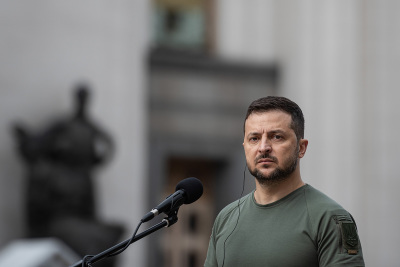Hidden costs of Ukraine's war

As we focus on our continued assistance to Ukraine, we want to uplift those in the country who are struggling to survive amidst the conflict of war as well as from complications from receiving treatment for HIV/AIDS.
After almost 10 months into Russia’s war on Ukraine, the end is not in sight. Putin’s ambition to claim the sovereign nation has had unfathomable results, including the deaths of and atrocities unleashed upon tens of thousands of Ukrainians. Thousands more have fled their homeland as refugees in neighboring nations to protect their families and to survive. Economically, the war has impacted everyone — with surging gas and food prices as supply and distribution are challenged, particularly for low-income nations that rely on Ukrainian grain exports.
But there is another hidden cost to this war as well: the disruption of HIV/AIDS treatment services for the almost quarter of a million Ukrainians who are HIV positive. Ukraine also has one of the highest tuberculosis (TB) burdens in the world. Without services, infections will spread, and people will die. Inside the country, the Russian invasion to date has damaged or destroyed more than 850 health facilities. Outside Ukraine, the refugee situation has exacerbated the ability to prevent and treat HIV and TB, as patients are less able to receive diagnostic support and vital treatment.
Like many faith communities across the globe, the St. Charles Ave. Baptist Church has focused our modest response efforts in Ukraine on the most urgent needs of food and shelter. We have provided direct funding to missionaries at the Ukraine-Poland border who have worked tirelessly to help Ukrainian families find temporary housing and safety as refugees, as well as supporting the essential work of World Central Kitchen. Not only do our collective efforts need to continue, but we also need to consider the broader needs of those still within Ukraine who are surviving day-to-day life in a war. For instance, the chance of girls and women — who never expected war and atrocities — to survive and thrive in good health weighs heavily in my own heart.
I have come to know and admire the work of the Global Fund to Fight AIDS, TB, and Malaria. In Ukraine, the Global Fund supports several organizations to help provide treatment and other support to people living with HIV and TB, while maintaining critical local ownership in decision-making. In March 2022, the Global Fund provided $15 million in emergency funding to maintain service continuity for HIV and TB services in Ukraine, on top of the $135.5 million of funding the Global Fund channeled to Ukraine from 2020 to 2022.
I’ve learned that the Global Fund, as the world’s leading multilateral partnership to end the AIDS, TB, and Malaria pandemics, has saved more than 50 million lives worldwide. In particular, the Global Fund takes critical steps to prevent and treat HIV infections among adolescent girls and young women. In 13 priority countries where the Global Fund invests, HIV incidence among women aged 15 to 24 has dropped by 56%.
In September, the United States hosted the Global Fund’s seventh replenishment conference. Thanks to U.S. diplomacy and leadership, Canada, Japan, Germany, and the European Commission each raised their pledges by nearly 30%, with France close behind. In Fiscal Year 2023, both the U.S. House and Senate State and Foreign Operations appropriations bills have a $2 billion contribution to the Global Fund. This leadership spurs those other donors, like those nations mentioned above, to match the U.S. The Global Fund estimates this $2 billion U.S. contribution could save an additional 2.3 million lives; prevent 51 million new infections or cases; provide 3.1 million people with antiretroviral therapy for HIV; test 37 million people for TB; get mosquito nets to 153 million people to protect them from malaria; and produce $58 billion in additional economic gains.
To stay on track to end the pandemic by 2030, I deeply feel that we need the heart and political will of Louisianans, and the bold leadership of Congress. This includes Rep. Julia Letlow (R-La.), who is a member of the House Appropriations Subcommittee on State and Foreign Operations. Her leadership on the Subcommittee offers an excellent opportunity to fulfill the commitments needed to continue U.S. leadership in global health. And as the second highest in the House Republican leadership, Rep. Steve Scalise (R-La.) can be a strong voice for this wise use of U.S. taxpayers’ resources with proven results.
As a faith leader, I find that these issues are not just health, economic, or security issues — these are also moral issues. People’s lives are at stake. My faith compels me to treat each life with equal value, helping the sick heal and the vulnerable find strength, wherever they may be in the world. As we read in John’s Gospel, we are to be known by the love we have for one another.
Let’s unite to encourage and support Letlow and others to carry the mantle of leadership in global health to defeat the three epidemics, overcome COVID-19 as an impediment to that imperative, and help countries like Ukraine fight to prevent and treat HIV and TB even amidst crisis and conflict.
Elizabeth Lott has served as Senior Pastor of the St. Charles Ave. Baptist Church in New Orleans since 2013. She earned an M.Div. from the Baptist Theological Seminary at Richmond and a B.A. in Religion at Samford University.



























